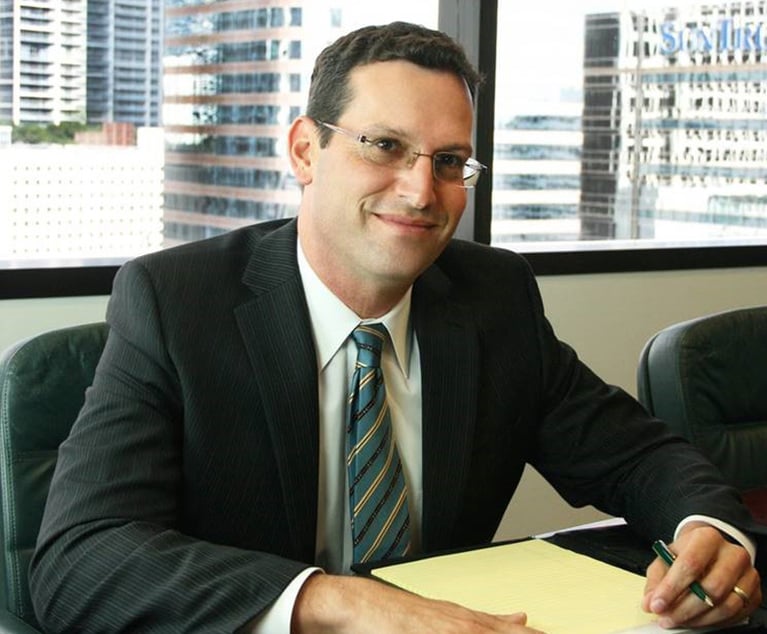 The Seminole Hard Rock Hotel and Casino in Hollywood, Florida. Photo by Buddy Phillips/Shutterstock.com.
The Seminole Hard Rock Hotel and Casino in Hollywood, Florida. Photo by Buddy Phillips/Shutterstock.com.Card Games Could Be Key in Seminole Tribe Gambling Deal
The state and the tribe are back at the negotiating table in hopes of finalizing a revenue-sharing agreement in which the Seminoles would pay the state in exchange for the exclusive rights to operate certain types of gambling.
April 16, 2019 at 11:30 AM
6 minute read
Sports betting, “designated player” card games and bingo are all on the table as a future Senate president tries to nail down a gambling deal with the Seminole Tribe of Florida as early as Friday.
The state and the tribe are back at the negotiating table in hopes of finalizing a revenue-sharing agreement, called a “compact,” in which the Seminoles would pay the state in exchange for the exclusive rights to operate certain types of gambling.
Controversial designated player games offered at many of the state's pari-mutuel cardrooms are a key element of any new deal. The Seminoles — and a federal judge — have maintained that the card games violate a 2010 gambling agreement with the state that gave the tribe “exclusivity” over offering banked card games, such as blackjack.
Former Gov. Rick Scott entered an agreement with the tribe in which the Seminoles have continued to pay about $350 million a year to the state, which pledged to “aggressively enforce” how the games are played. But that agreement expires on May 31, and the Senate hasn't included the revenue in next year's budget.
Even with $350 million at stake, reaching an accord with the tribe has proved elusive for years for state lawmakers, in part because any deal in the fiercely competitive gambling arena is further complicated by pari-mutuel operators.
According to sources close to the latest round of talks, the state is offering to impose greater restrictions on the designated player games, something the Seminoles have insisted on.
The state is dangling a sweetener to pari-mutuel operators, many of whom are relying more and more on the card games: bingo.
But it's questionable whether the pari-mutuels would be happy with paper bingo games, which exist in a universe separate from the fast-paced designated player games that have involved bets of $50,000 on a single hand.
A more alluring perk for the pari-mutuels, also part of the discussions, would allow sports betting at dog tracks, horse tracks and jai alai frontons, as well as professional sports arenas. The U.S. Supreme Court opened up the possibility of sports betting in Florida with a ruling last year in a New Jersey case.
The Seminoles would serve as a “hub” for sports betting, meaning they would get a cut of the bets being made outside of their facilities, while being allowed to run sports books at their own casinos, the sources said.
Even bingo and sports betting, which generates a small amount of profit, may not be enough to satisfy the pari-mutuel operators.
“The sweeteners won't offset the loss in revenue if designated player games are outlawed,” lawyer John Lockwood, who represents several of the pari-mutuels, said in an interview. “If these tweaks are anything like the tweaks they've proposed in the past, nobody will even offer the games.”
The tribe also wants to add craps and roulette as well as online betting to its suite of games, but the people close to the talks told The News Service of Florida that online games are off the table after Gov. Ron DeSantis raised objections.
Sen. Wilton Simpson, a Trilby Republican who's slated to take over as Senate president following the 2020 elections, is in charge of negotiating a deal with the tribe. The Senate leader confirmed that “negotiations are still ongoing,” but no agreement had been finalized.
“Everything you're talking about is clearly part of what would be being negotiated, but there are not any conclusions on those subjects,” Simpson said in a telephone interview Monday.
As in past years, the elements of the compact are connected, Simpson said.
“In other words, it has to be totally concluded before there would be any conclusion [on any specific issue]. So it would not be accurate to pick out any detail and say, 'OK, this thing has absolutely been agreed upon,' ” he said.
The tribe has been tight-lipped about the talks, but the sources said the discussions involve boosting the tribe's current payments to the state to about $500 million a year.
The biggest sticking point remains how much the tribe is willing to cede on the designated player games and the possible impact on the pari-mutuels.
“They can put together a compact that gives them everything that a Las Vegas casino would die for, with the best tax rates in the country. So why wouldn't they want to do that?” lobbyist Brian Ballard, who represents numerous sports leagues and pari-mutuels, said in a telephone interview Monday. “The question is going to be, will their efforts to be so dominant in the marketplace be an overreach that we end up with no bill, or a bill that can't pass the Legislature.”
One controversial item that's been at play in the past — slots machines for pari-mutuels outside of Broward and Miami-Dade counties — is no longer up for discussion, thanks to a constitutional amendment approved in November. That amendment requires voters to authorize gambling expansions, but negotiators don't believe other gambling changes being discussed would need voter approval.
“Everything I'm hearing is in the four corners of the negotiations would not require a statewide referendum,” Ballard said.
With the legislative session scheduled to end May 3, Simpson said he hopes to have a bill filed by the end of this week.
“It becomes increasingly more difficult, not necessarily impossible, but after this week, we're down to two weeks. This is obviously a substantial piece of legislation, if we can come to an agreement. We can get it done in the last two weeks, but it would be nice to hopefully get something done by the end of the week,” he said.
Ballard, however, said that racing against the clock might help negotiators reach a compromise.
“You have to have time pressures to make gaming deals, so three weeks left in session is beginning to put that level of pressure on. I think you need those things, otherwise the parties won't come together,” he said.
Speaking to reporters last week, House Speaker José Oliva acknowledged that elements of a gambling agreement “require a lot of back-and-forth,” but said there's still time to seal a deal before the session ends.
“The thing about session is that in the last few weeks, we really start to use every hour of the day,” Oliva, R-Miami Lakes, said.
Dara Kam reports for the News Service of Florida.
This content has been archived. It is available through our partners, LexisNexis® and Bloomberg Law.
To view this content, please continue to their sites.
Not a Lexis Subscriber?
Subscribe Now
Not a Bloomberg Law Subscriber?
Subscribe Now
NOT FOR REPRINT
© 2024 ALM Global, LLC, All Rights Reserved. Request academic re-use from www.copyright.com. All other uses, submit a request to [email protected]. For more information visit Asset & Logo Licensing.
You Might Like
View All

How Uncertainty in College Athletics Compensation Could Drive Lawsuits in 2025

Wachtell Helps Miami Dolphins Secure One of NFL’s First Private Equity Deals
3 minute read
$1,575 Daily Interest Is Being Added in This Landmark Miami Case
Trending Stories
- 1Pa. Hospital Agrees to $16M Settlement Following High Schooler's Improper Discharge
- 2Connecticut Movers: Year-End Promotions, Hires and an Office Opening
- 3Luigi Mangione Defense Attorney Says NYC Mayor’s Comments on Case Raise Fair Trial Concerns
- 4Revisiting the Boundaries Between Proper and Improper Argument: 10 Years Later
- 5Hochul Vetoes 'Grieving Families' Bill, Faulting a Lack of Changes to Suit Her Concerns
Who Got The Work
Michael G. Bongiorno, Andrew Scott Dulberg and Elizabeth E. Driscoll from Wilmer Cutler Pickering Hale and Dorr have stepped in to represent Symbotic Inc., an A.I.-enabled technology platform that focuses on increasing supply chain efficiency, and other defendants in a pending shareholder derivative lawsuit. The case, filed Oct. 2 in Massachusetts District Court by the Brown Law Firm on behalf of Stephen Austen, accuses certain officers and directors of misleading investors in regard to Symbotic's potential for margin growth by failing to disclose that the company was not equipped to timely deploy its systems or manage expenses through project delays. The case, assigned to U.S. District Judge Nathaniel M. Gorton, is 1:24-cv-12522, Austen v. Cohen et al.
Who Got The Work
Edmund Polubinski and Marie Killmond of Davis Polk & Wardwell have entered appearances for data platform software development company MongoDB and other defendants in a pending shareholder derivative lawsuit. The action, filed Oct. 7 in New York Southern District Court by the Brown Law Firm, accuses the company's directors and/or officers of falsely expressing confidence in the company’s restructuring of its sales incentive plan and downplaying the severity of decreases in its upfront commitments. The case is 1:24-cv-07594, Roy v. Ittycheria et al.
Who Got The Work
Amy O. Bruchs and Kurt F. Ellison of Michael Best & Friedrich have entered appearances for Epic Systems Corp. in a pending employment discrimination lawsuit. The suit was filed Sept. 7 in Wisconsin Western District Court by Levine Eisberner LLC and Siri & Glimstad on behalf of a project manager who claims that he was wrongfully terminated after applying for a religious exemption to the defendant's COVID-19 vaccine mandate. The case, assigned to U.S. Magistrate Judge Anita Marie Boor, is 3:24-cv-00630, Secker, Nathan v. Epic Systems Corporation.
Who Got The Work
David X. Sullivan, Thomas J. Finn and Gregory A. Hall from McCarter & English have entered appearances for Sunrun Installation Services in a pending civil rights lawsuit. The complaint was filed Sept. 4 in Connecticut District Court by attorney Robert M. Berke on behalf of former employee George Edward Steins, who was arrested and charged with employing an unregistered home improvement salesperson. The complaint alleges that had Sunrun informed the Connecticut Department of Consumer Protection that the plaintiff's employment had ended in 2017 and that he no longer held Sunrun's home improvement contractor license, he would not have been hit with charges, which were dismissed in May 2024. The case, assigned to U.S. District Judge Jeffrey A. Meyer, is 3:24-cv-01423, Steins v. Sunrun, Inc. et al.
Who Got The Work
Greenberg Traurig shareholder Joshua L. Raskin has entered an appearance for boohoo.com UK Ltd. in a pending patent infringement lawsuit. The suit, filed Sept. 3 in Texas Eastern District Court by Rozier Hardt McDonough on behalf of Alto Dynamics, asserts five patents related to an online shopping platform. The case, assigned to U.S. District Judge Rodney Gilstrap, is 2:24-cv-00719, Alto Dynamics, LLC v. boohoo.com UK Limited.
Featured Firms
Law Offices of Gary Martin Hays & Associates, P.C.
(470) 294-1674
Law Offices of Mark E. Salomone
(857) 444-6468
Smith & Hassler
(713) 739-1250






